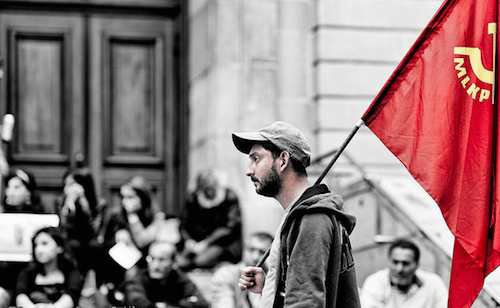By Brandon Roselius
For the past three and a half months the Syrian town of Kobanî has been under siege by Islamic State forces. Located right on the border between Syria and Turkey, Kobanî was essentially surrounded by Islamic State forces on three sides with their retreat blocked by the Turkish army.
Since mid October Kobanî has held out against an enemy who is better equipped and vastly outnumbers the town’s defenders. In the early stages of the siege only the People’s Protection Units (YPG) defended Kobanî. The YPG is the armed wing of Syria’s Kurdish Democratic Union Party.
Over the course of November and December reinforcements streamed into Kobanî from Turkey and Iraq in the form of supplies and fighters. Turkish Kurds belonging to the PKK, Kurdistan Worker’s Party, and the Kurdistan Regional Government’s Peshmerga streamed into Kobanî. With the assistance of the U.S. and Arab League airstrikes, the combined Kurdish forces have nearly completely pushed IS forces out of Kobanî’s city limits completely.

Kobanî is the Kurdish Alamo. An unlikely alliance between Iraqi, Syrian and Turkish Kurds pushed back a stronger and better-equipped opponent. While the real Alamo was far less successful, it became a rallying cry for the Texans in their war against Santa Anna. In the same vein, Kobanî has become a rallying cry for all Kurds and a symbol of pan-Kurdish nationalism. It’s an accomplishment very few expected and even fewer predicted. Why?
The PKK and the KDP have not historically gotten along. The PKK represents a large majority of Turkey’s Kurds and has been diametrically opposed to the Turkish state until a recent ceasefire. The KDP is the dominant party of Iraq’s Kurdistan Regional Government (KRG). Recently, the KRG and Turkey have agreed to a number of economic deals that have greatly benefitted both parties. The KDP doesn’t want to endanger its dealings with Turkey, so it has taken a hard stance on PKK movement inside its borders. Nevertheless, both PKK forces and the KRG’s Peshmerga fought together in Kobanî under joint command.
This mutual defense should not be overlooked, and it represents a huge step for Kurdish aspirations across the Middle East. However, just as Kobanî has been a showcase of Kurdish success it has also highlighted the dangerous position that Turkey plays in Kurdish development.
Coinciding with the siege of Kobanî have been increased protests across Turkey’s Kurdish territory. The Turkish government has prevented a great deal of aid from reaching Kobanî, going as far as to completely close the border down and prevent any movement in or out of Kobanî. Furthermore, Turkey has been recently accused of aiding IS forces with supplies and desperately needed medicine. These accusations have angered Turkey’s Kurdish population, and led to increasingly violent clashes between state forces and Kurdish civilians—clashes that more often than not have resulted in casualties for the Kurds.
Increased tensions between Turkey and Turkey’s Kurds endanger much of what the KRG has accomplished in recent years, but swearing off support for Turkey’s Kurds and siding with Turkey could potentially damage the KRG’s position within Greater Kurdistan.
While the Siege of Kobanî will most likely result in a Kurdish victory and perhaps even come to represent a moment of pan-Kurdistan unity, Turkey’s role, or lack thereof, in Kobanî cannot be ignored. With Turkey an economic ally of the KRG and South Kurdistan and an enemy of the PKK and oppressor of North Kurdistan, the Kurds most difficult task has yet to be broached. How do the Kurds maintain and take advantage of the unity they have gained in Kobanî in the face of Turkey—an enemy to one and an ally to the other?














